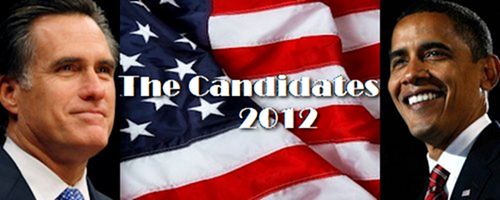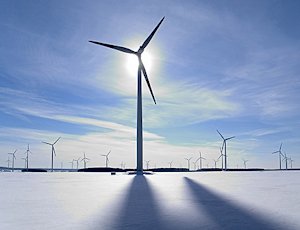
The Candidates and Energy 2012 - Page 2
Alternative Energy
With new technology comes new energy, and in the long run, it is inevitable that what we would today call "alternative" will become more economically viable than what we currently call "standard." The price of oil is already on the rise and will continue to go up until it becomes prohibitively expensive, though there may be a few dips and valleys in the curve along the way. However, predicting which technology will ultimately replace it is an exercise in futility. There is nothing inherently wrong with granting money to alternative energy companies, but no one should believe that the State is somehow wiser than professional investors and speculators who have far more incentive to fully understand and anticipate the risks involved. Therefore, my perfect candidate wouldn't try too hard to pick winners and losers, letting the free market run its course with as little interference as possible.
 | | Wind turbines kill 40,000 birds a year |
According to Romney's website, "Mitt will promote innovation by focusing the federal government on the job it does best – research and development – and will eliminate any barriers that might prevent new energy technologies from succeeding on their own merits. Strengthening and streamlining regulations and permitting processes will benefit the development of both traditional and alternative energy sources, and encourage the use of a diverse range of fuels including natural gas in transportation." In his more detailed plan, he argues that he will "ensure that policies for expanding energy development apply broadly to energy sources, from oil and gas exploration, to coal mining, to the siting of wind, solar, hydroelectric, and other renewable energy facilities." He thinks government money should be allocated to research and development firms across the board, not to specific businesses in specific energy industries, confident that the energy businesses of the future will develop more efficiently under competition than they will under government grants.
President Obama boasts success in doubling wind and solar energy under his watch [6]. While conservatives harp on the failures of Solyndra and other companies that the Obama administration invested in, his spending has seen results more often than failures. He promises to continue funding projects in solar energy, wind power, and biofuels, and doesn't appear to have any plans to change his spending methodology.
Again, this isn't as cut-and-dry as the partisans want us to believe. We can quibble over how well-spent government money was when it comes to all the alternative energy companies being funded under President Obama--whether the results were worth the cost--but we cannot argue that there were verifiable results. Still, as a fan of the free market, I would still side with Romney, agreeing with his premise that market competition is more effective than government funding. In the long run, I do believe that Romney's approach will see quicker and better results than the results we will get out of another four years of Obama's policies.
Foreign Oil
The Libertarian Perspective
Gary Johnson wants to end all subsidies and incentives for specific energy resources. He also wants to do a cost benefit analysis of all federal energy regulations, ensuring that the role of government intervention is limited to stopping bad actors from doing harm. He supports nuclear and other alternative energies, he wants to approve the Keystone pipeline, and he thinks federal energy tax incentives should be allocated by the states.
 Johnson largely agrees with Romney on most of these matters, excepting subsidies for oil companies. If it were a decision between all three candidates and energy were the only relevant issue, therefore, Johnson would score higher for me than the other two.
Johnson largely agrees with Romney on most of these matters, excepting subsidies for oil companies. If it were a decision between all three candidates and energy were the only relevant issue, therefore, Johnson would score higher for me than the other two. |
History buffs like to argue that the history of war is a history over the competition for natural resources. I think this is an overly simplistic view, but it's not completely off the mark. When it comes to the most important natural resource in the modern world, oil, it is hard not to see a connection between where the most unrest is and where the most oil is being produced. The international oil trade is not, in and of itself, a bad thing, but the percentage of oil being imported by America is way too high to be healthy. If we want to continue being a superpower in the 21st Century, we should work to not only be energy independent, but to produce more oil than we use so that we can be an energy exporter. Not only would that secure our own interests, but it would also be of great benefit to the world at large (since trade is growth, not a zero sum game). Having said that, we can't become independent immediately, so in the interim, we need to make sure we're getting our foreign oil from friendly nations instead of hostile ones. This is why the failure to approve the Keystone XL pipeline is such a tragedy, because it could be a missed opportunity to reduce our dependence on oil from the middle eastern cartel, instead giving Canada the opportunity to export its oil surplus to China, our chief economic competitor.
Romney wants to approve the Keystone XL pipeline as quickly as possible as well as establish a "regional agreement to facilitate cross-border energy investment, infrastructure, and sales" across all of North America. As I've already mentioned, his ultimate goal is North American energy independence by 2020. While this isn't as good as true energy independence, it is much better and safer than dealing with OPEC.
President Obama cites the increase in domestic oil production and fuel efficiency standards under his administration as working to encourage energy independence. However, he has resisted making a decision on the Keystone XL pipeline, postponing it until 2013 because "a full assessment of the pipeline's impact" has not been adequately completed.
My Choice if Energy Were the Only Relevant Issue
  |
| The Candidates and Energy |
  |
|
President Obama talks the talk about an "all of the above" energy policy, but he seems to be dragging his feet on nuclear energy and the Keystone XL pipeline. He is also unwilling to reconsider existing federal energy regulations before adding new ones. However, nuclear reactors are being built for the first time in a generation, alternative energy has increased (though it's hard to say whether it wouldn't have increased under a different administration), and domestic oil and gas production has risen to a new 21st Century high. He also wants to end oil subsidies.
Still, Romney has more faith in the free market and the states to make their own decisions, is eager to streamline energy regulations, is more vocal in his support of nuclear power, and would immediately approve the Keystone XL pipeline. He doesn't want to throw federal money at questionable energy companies--instead preferring to put that money into research and development--and his goal of North American independence by 2020 is more ambitious than Obama's plan to reduce oil imports by half in the same time period. He doesn't get everything right--he is quiet about ending oil subsidies--but his vision for the energy future of America is better, I think, than Obama's.
-e. magill 10/2/2012
|
|